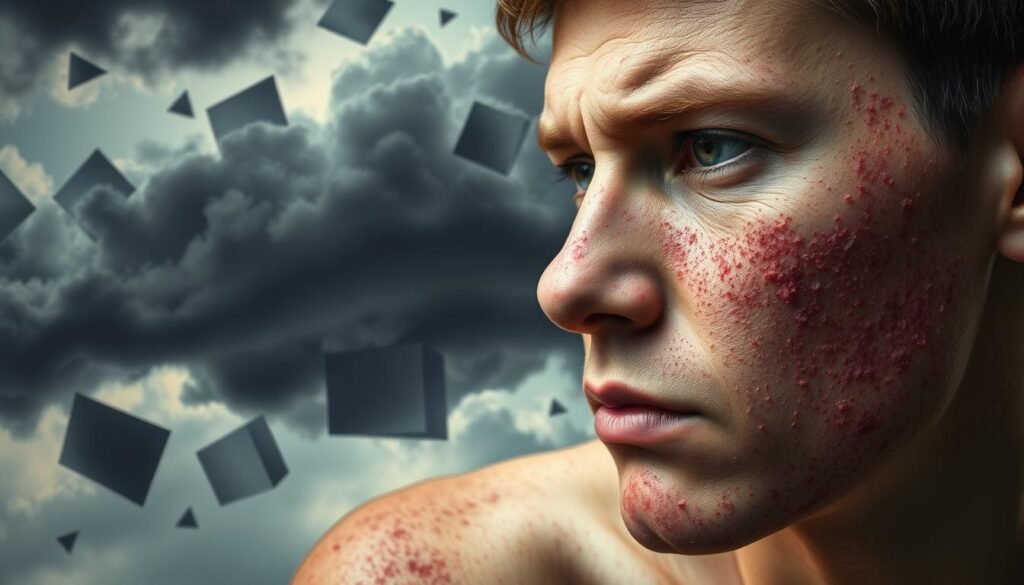A study identified more than 526,808 adults with atopic dermatitis. It showed they face significant psychological challenges besides the skin condition. They are more likely to develop anxiety and depression. This connection between atopic dermatitis and mental health is critical for understanding how it affects life quality.
Atopic dermatitis creates a cycle where physical discomfort leads to mental distress. This can increase anxiety and depression. The article discusses this link and coping strategies. These strategies aim to help people manage their emotional challenges and improve their well-being.
Key Takeaways
- Atopic dermatitis is linked to increased risks of anxiety and depression.
- Psychological struggles can exacerbate the severity of skin symptoms.
- A significant percentage of patients demonstrate alexithymic traits.
- Sleep disturbances are correlated with heightened depression in these patients.
- Understanding these effects can help in developing better coping strategies.
Understanding Atopic Dermatitis and Its Symptoms
Atopic dermatitis, also known as eczema, is a common but serious skin disease. It causes long-term skin inflammation. About 10% of adults in developed countries suffer from it. It brings both physical discomfort and emotional distress. Knowing the symptoms is crucial for early help and managing it well.
Key symptoms of atopic dermatitis are:
- Intense itching
- Dry, flaky skin
- Red patches, usually on the face, neck, and behind the knees
- Unpredictable flare-ups
Symptoms of eczema can greatly impact life. Children with eczema often face anxiety and depression. About 30% of these children have trouble sleeping five or more nights a week. This sleep loss can make them tired and irritable during the day. It makes their daily life harder.
Eczema affects more than just the skin. It often brings mood changes. There’s a clear link between eczema in children and symptoms of ADHD. This shows the complex effects of this skin problem.
It’s very important to pay attention to eczema symptoms. Doing so helps avoid long-lasting emotional and psychological harm. Managing eczema well means working together. Patients and healthcare providers must focus on both skin care and overall well-being.
| Symptom | Description | Impact on Daily Life |
|---|---|---|
| Itching | Intense desire to scratch | Causes skin damage and sleep disturbance |
| Dryness | Flaky and rough skin texture | Leads to discomfort and irritability |
| Redness | Inflammation of the skin | May cause embarrassment and anxiety |
| Flare-ups | Sudden exacerbation of symptoms | Can disrupt daily activities and routines |
How Atopic Dermatitis Affects Quality of Life
Atopic dermatitis changes the lives of those who live with it deeply. The itch and discomfort hardly ever go away. These symptoms often lead to trouble sleeping. In fact, between 33% and 90% of adults with the condition report sleep problems. This lack of sleep makes them feel more tired and stressed, making everyday life harder.
The mental impact of eczema is serious too. Those with atopic dermatitis are more likely to feel depressed or anxious. For example, a study found that nearly 57% of adults with the condition might be depressed. This is much higher than the 15.7% in folks without eczema. This shows the heavy mental weight that comes with the physical symptoms.
Eczema can hurt one’s social life and job performance due to the emotional stress. The way it makes the skin look can lead to feeling alone and losing confidence. It’s clear then, taking care of eczema isn’t just about treating the skin. It also means helping with the mental health side of things.
Doctors need to think about how eczema affects life beyond just the skin. By understanding the mental struggles that come with it, they can offer better overall care. This can make life better for those dealing with this long-term skin issue.
| Parameter | Patients with AD | Healthy Controls |
|---|---|---|
| Alexithymic features (%) | 56.3 | 21.3 |
| Depression prevalence (%) | 56.9 | 15.7 |
| Suicidal ideation risk (%) | 44 | – |
| Sleep disturbances observed (%) | 33–90 | – |
Mental Health Effects of Atopic Dermatitis
Atopic dermatitis (AD) greatly impacts mental health, causing many psychological effects. Studies show a clear link between atopic dermatitis and higher depression rates. Over 30% of people with AD have been diagnosed with depression or anxiety. This is much higher than the general population’s rate of about 7.6%. Those with AD often face a tough cycle of emotional distress and worsening skin symptoms because of the psychological burden.
Connection Between Atopic Dermatitis and Depression
AD and depression are closely linked for several reasons. People with this chronic skin condition may feel sad, hopeless, and lose interest in activities. These factors intensify the mental health effects seen in patients. The risk of getting a new depression diagnosis is 1.14 times higher for individuals with atopic dermatitis. Stress can make skin inflammation worse, increasing both physical pain and mental struggles. Monitoring mental health is vital for these individuals. For more information, check the studies here.
Link Between Atopic Dermatitis and Anxiety
Anxiety is another major issue for people with atopic dermatitis, showing a 1.17 hazard ratio for new diagnoses. The unpredictability of flare-ups adds constant stress and worry. This can lead to more mental health disorders. Symptoms like trouble concentrating, restlessness, and difficulty sleeping are common. These issues can lower a person’s emotional well-being. Finding support, making lifestyle changes, practicing mindfulness, and keeping a regular sleep schedule can reduce anxiety related to AD.
Psychological Impact of Atopic Dermatitis
Atopic dermatitis can cause a lot of emotional pain. People may feel shame and guilt because of their skin. These emotions often lead to staying away from friends.
Children might avoid playing with others, feeling worried about how they look. They feel they can’t control their flare-ups, which makes things worse.
Emotional Distress and Social Isolation
Atopic dermatitis can make people feel very sad. The worry about skin being seen can make it hard to be with others. This can make someone feel left out.
It’s especially tough for kids who can’t explain their feelings. They might not join in, which makes them even more isolated. Understanding these feelings is key to helping.
Effects on Self-Esteem
The way atopic dermatitis looks can really affect how people feel about themselves. They often feel bad about how they look. This can make someone’s self-esteem really low.
They might feel like they aren’t good enough. Having to deal with treatments can be hard, too. It’s important to help people with eczema feel better about themselves.

| Aspect | Impact on Mental Health | Common Emotional Responses |
|---|---|---|
| Social Isolation | Increased anxiety and feelings of rejection | Embarrassment, loneliness |
| Self-Esteem | Lowered self-worth | Shame, guilt |
| Body Image | Heightened self-consciousness | Negative self-perception |
| Emotional Distress | Feelings of helplessness | Frustration, sadness |
The Link Between Itch, Sleep Disturbance, and Mental Health
Atopic dermatitis affects more than just the skin. It plays a big role in sleep problems and mental health issues. Those with ongoing itchiness often face insomnia, leading to emotional stress. This cycle between itchiness and sleep troubles can worsen mental health.
Coping with Sleep Issues
It’s important to handle sleep problems for anyone with atopic dermatitis. Creating a calm bedtime routine can ease the symptoms. Adding relaxation methods like meditation or gentle yoga helps fight insomnia. Also, improving sleep habits by making the bedroom comfy and cutting down on screen time before bed is crucial. There’s help available online; one can find useful apps to track eczema. Check out this guide on eczema management apps.
Impact of Itching on Emotional Well-Being
Chronic itching from atopic dermatitis can lead to strong emotional stress. It traps people in a cycle where the itchiness makes stress and anxiety worse. Studies show atopic dermatitis sufferers are much more likely to have depression and anxiety. Effective itching treatments and mindfulness can really improve mental health. Knowing how atopic dermatitis affects the mind underscores the need for full management plans.
| Population | Sleep Disturbances (% incidence) | Associated Conditions |
|---|---|---|
| Children with atopic dermatitis | 47% – 80% | Increased arousals, daytime sleepiness |
| Adults with atopic dermatitis | 33% – 90% | Increased anxiety, depression risk |
| Parents of children with atopic dermatitis | 60% – 65% | Reported emotional distress |
| Individuals in remission | Higher arousals than healthy controls | Potential long-term psychological effects |
Coping Strategies for Managing Mental Health
People dealing with atopic dermatitis may find helpful strategies for their mental health. Trying mindfulness, joining support groups, and getting professional help are good for emotional well-being. These methods help in handling anxiety too.
Implementing Mindfulness Practices
Mindfulness, like meditation and deep breathing, helps reduce stress for those dealing with eczema. These practices ground individuals, cutting down stress and improving emotional steadiness. Adding mindfulness to daily life improves quality of life and helps manage eczema better.
Joining Support Groups
Being part of support groups connects you with others facing similar issues. This community support reduces loneliness and encourages open discussions. Regular participation in these groups boosts emotional support and coping skills, positively affecting mental health.
Seeking Professional Help
Therapy or counseling is effective for anxiety and depression caused by atopic dermatitis. Mental health experts customize strategies to ease psychological distress. Getting professional help teaches coping strategies and provides resources for emotional challenges.

| Strategy | Benefits | Key Focus Areas |
|---|---|---|
| Mindfulness Practices | Enhanced emotional well-being, reduced stress | Meditation, breathing exercises |
| Support Groups | Improved coping skills, reduced isolation | Community connection, shared experiences |
| Seeking Professional Help | Tailored coping strategies, mental health support | Therapy, counseling resources |
For more coping strategies, visit how to cope with atopic dermatitis.
Effectiveness of Treatment Adherence on Mental Health
Following your treatment plan closely can really help both your body and mind. When you stick with your medication, you’re not just dealing with symptom management, you’re also fighting off anxiety and depression. Staying true to your treatment can lead to a happier life.
The Role of Medication in Reducing Symptoms
Medication is key in easing the discomfort of atopic dermatitis. Topical creams and certain inhibitors are proven to help. For tougher cases, stronger medicines like cyclosporine or dupilumab make a big difference. Using these meds regularly helps you stay on track and feel better overall.
Importance of Following Treatment Plans
Keeping up with your treatment is super important. Using your meds as directed cuts down on bad skin days and mental stress. Learning about your health condition gives you the power to stick with your treatment plan. Knowing how it all affects your mental health makes it easier to keep up with your care.
Utilizing Lifestyle Changes to Alleviate Symptoms
Making lifestyle changes can help manage atopic dermatitis (AD) and improve mental health. Regular exercise boosts physical and emotional well-being. It increases endorphins, reducing stress and enhancing mood.
When exercising, stay hydrated and wear the right clothes to avoid skin issues. Aim for 150 minutes of cardio each week to improve health.
Exercise and Its Benefits
Having a supportive home environment is crucial for those with AD. Talk openly with loved ones to build understanding and empathy. This reduces feelings of being alone.
It makes seeking help easier. Teaching friends and family about AD helps them support you better in your daily life.
Creating a Supportive Environment
Combining lifestyle changes with specific strategies can ease AD symptoms. For ideas on balanced living and self-care, check out this self-care for atopic dermatitis link. These adjustments can lead to better skin health and life quality.